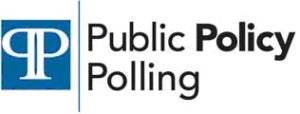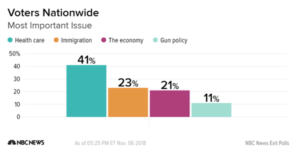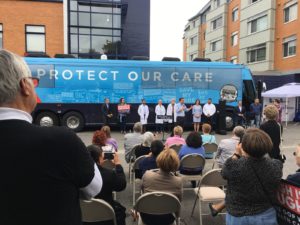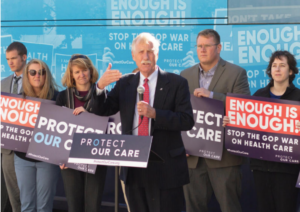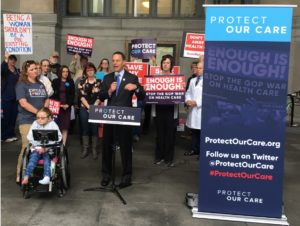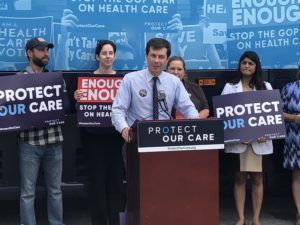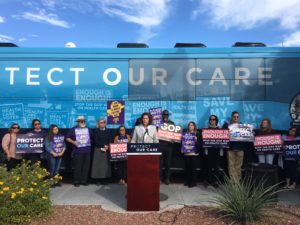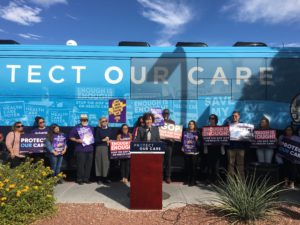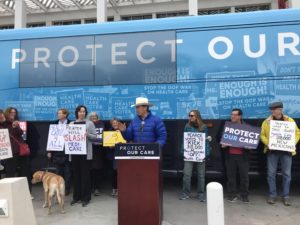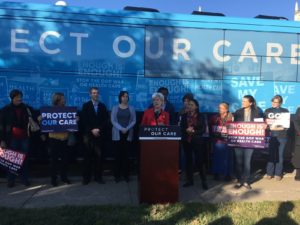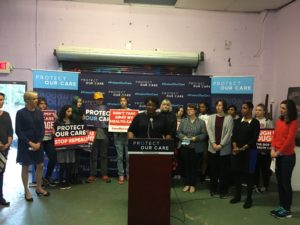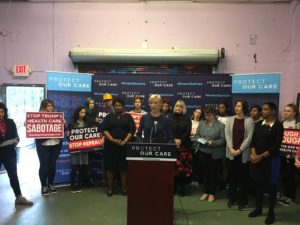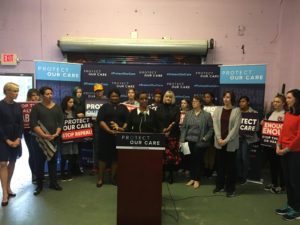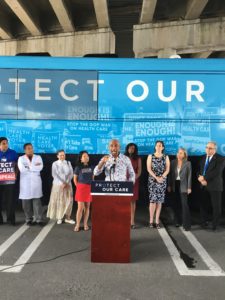Traveling Nearly 12,000 Miles, Care Force One Made 49 Stops in 24 States to Hold Republicans Accountable for Voting to Take Away Our Care

Care Force One in St. Louis, Missouri.
This afternoon, Protect Our Care is wrapping up its nationwide bus tour at a joint rally in West Palm Beach, Florida, with Nuns on the Bus. Over the past six weeks, Protect Our Care took the health care fight to communities as its bus, Care Force One, traveled 12,000 miles, making 49 stops in 24 states.
“No matter where we went, we heard the same thing,” said Brad Woodhouse, executive director of Protect Our Care. “Americans all over are sick and tired of the Republican-led war on health care. And you know what else? They’re fired up about their chance to fight back next week at the polls.”
“Like a touring country band,” Care Force One visited Connecticut, Maine, New York, New Jersey, Pennsylvania, Ohio, West Virginia, Indiana, Michigan, Wisconsin, Iowa, Minnesota, North Dakota, Montana, Nevada, Arizona, New Mexico, Colorado, Missouri, Tennessee, Virginia, North Carolina, Georgia, and Florida.
Joining Protect Our Care’s leaders Leslie Dach and Brad Woodhouse and cancer survivor Laura Packard on the bus tour were former U.S. Secretary of Health and Human Services Kathleen Sebelius; U.S. Senators Chris Murphy (D-CT), Richard Blumenthal (D-CT), Angus King (I-ME), Catherine Cortez Masto (D-NV), and Tom Udall (D-NM); U.S. Representatives Chellie Pingree (ME-01), Jacky Rosen (NV-03), Dina Titus (NV-01), and Jim Cooper (TN-05); former Georgia House Minority leader Stacey Abrams; Pennsylvania Attorney General Josh Shapiro; South Bend, Indiana Mayor Pete Buttigieg; former Planned Parenthood President Cecile Richards; American Federation of Teachers President Randi Weingarten; Center for American Progress President Neera Tanden; television personality Montel Williams, and many more.
“I’m alive because of the Affordable Care Act,” said health care advocate Laura Packard, who was on the tour for all 49 stops. “I’m a stage four cancer survivor and I traveled across the country to defend our attacks against the GOP. President Trump may have blocked me on Twitter, but he can’t stop me and the American people from fighting to protect our care.”
At a time when health care is consistently ranked as a top issue for the public, the tour highlighted that the Republican war on health care is very much alive, with GOP leaders doubling down on their calls to repeal health care and cut billions from Medicare and Medicaid, all while using regulations and the courts to continue their attacks on protections for the 130 million Americans with pre-existing conditions, for women, older Americans, and Medicaid and Medicare enrollees.
Here’s a snapshot of what happened on the tour:
At Care Force One’s kickoff event, U.S. Senators Chris Murphy and Richard Blumenthal and businessman Ned Lamont were joined by nearly 100 community members outside a Bridgeport Community Health Center to call attention to Republicans’ ongoing war on health care care.

“Connecticut made the decision to try to make the Affordable Care Act work, not undermine it like many other states did,” said Senator Chris Murphy. “Think about the 20 million Americans who have been given access to health care, whose lives have been changed. Just imagine what that number would be if every other state approached the Affordable Care Act the way Connecticut did.”
Traveling north from Connecticut, Care Force One made its way up to Maine, where U.S. Senator Angus King and Congresswoman Chellie Pingree joined state representatives and Mainers with pre-existing conditions at Portland City Hall to speak out against the devastating repercussions of health care repeal.

“We’ve got to continue to fight against repeal,” said Senator Angus King. “I call it a zombie proposal because it keeps coming back, and it’s a terrible idea and we have to keep trying to push that back to try and protect Medicare as well as the Affordable Care Act.”
Care Force One then headed west for three events in Pennsylvania, where state Attorney General Josh Shapiro, former Congresswoman and current Erie County Executive Kathy Dahlkemper, state senators, state representatives, and Pennsylvanians of all backgrounds hosted rallies in Harrisburg, Erie, and Pittsburgh to defend the ACA and Medicaid.

“The Affordable Care Act has expanded coverage for millions of Pennsylvanians, especially those living with pre-existing conditions, and I will do everything in my power to protect that coverage,” said Attorney General Josh Shapiro. “Now more than ever, we need our elected officials to stand up and defend the protections created by the ACA.”

In its second week, Care Force One was welcomed to South Bend, Indiana by Mayor Pete Buttigieg. “This isn’t about politics, this is about our lives, our livelihoods, and our well being,” said Mayor Pete Buttigieg. “This is our opportunity to raise our voices and say enough is enough when it comes to baseless attempts to take away the protection of our health care.”

(Photo by C.S. Hagen, High Plains Reader)
(Photo by C.S. Hagen, High Plains Reader)
After stops in Michigan, Wisconsin, Iowa, and Minnesota, week three brought Care Force One to Fargo, North Dakota, where the bus was joined by State Sen. Jim Dotzenrod, former State Sen. Mac Schneider, former State Rep. Ben Hanson, and North Dakotan Jennifer Restemeyer, who shared the story of her daughter, Allison, who suffers from a genetic disorder. As the High Plains Reader reported, Allison “wouldn’t be alive today if the Affordable Care Act hadn’t been passed.”

From there, Care Force One headed west to Montana, for a series of health care roundtables at health centers in Billings, Butte, and Missoula with local elected officials, health care professionals, representatives from the office of Sen. Jon Tester, and Montanans who have gained coverage under the ACA. After enactment of the law, the states has seen its uninsured rate cut in half.
Week four of the tour found Care Force One in Nevada, Arizona, New Mexico, and Colorado with a number of elected officials, including U.S. Senators Catherine Cortez Masto and Tom Udall, U.S. Representatives Jacky Rosen and Dina Titus, and former U.S. Representatives Ann Kirkpatrick and Steven Horsford.

“The Trump Administration’s repeated efforts to sabotage the Affordable Care Act threaten to put the cost of health care out of reach for too many families and once again allow insurance companies to discriminate against people with preexisting conditions,” said Senator Catherine Cortez Masto in Las Vegas. “I’ll continue fighting to improve the ACA, make premiums more affordable, and ensure that every Nevadan is able to access quality, affordable health care.”

“Right now, our health care system is under attack from the Trump Administration and Republicans in Washington,” said Congresswoman Jacky Rosen. “I’m fighting in Congress to stabilize the markets, bring down the cost of premiums and prescription drugs, and ensure hardworking Nevadans with pre-existing medical conditions are protected. It’s time for Republicans to work with Democrats to protect and improve our health care system instead of sabotaging and dismantling it.”

“Washington should protect our health care – overwhelmingly, New Mexicans want us to protect people with pre-existing conditions from being gauged by insurance companies or thrown off their insurance altogether,” Senator Tom Udall said. “Overwhelmingly, they want to keep the Medicaid expansion. And the American people don’t want the Trump administration or the Republicans in Congress dismantling Medicare.”
Care Force One kicked off week five in Kansas City, Missouri at a lively event with former Health and Human Services Secretary Kathleen Sebelius and Sharice Davids.

“Instead of protecting people with pre-existing conditions, politicians like Attorney General Josh Hawley and Congressman Kevin Yoder have joined the assault against them – forcing millions of families across Missouri and Kansas to live in fear of their coverage being taken away,” said Secretary Kathleen Sebelius. “These Republicans have tried every trick in the book to let insurance companies go back to discriminating against people based on their medical histories. I’ve seen first-hand the lifesaving impact these protections have had, and today people across the heartland are standing up, speaking out and calling on Republicans to stop this harmful war on health care once and for all.”
After stops in St. Louis and Springfield, Missouri, Memphis and Nashville, Tennessee, Richmond, Virginia, and Raleigh, North Carolina, Care Force one visited Atlanta, Georgia, for a star-studded event with Stacey Abrams, former Planned Parenthood president Cecile Richards, former U.S. Representative Donna Edwards, and Georgians of all backgrounds concerned over GOP attempts to take away Americans’ health care.

“I know what it’s like to lose everything and to not necessarily have children or family members to step up and help,” said Stacey Abrams. “800,000 people in Georgia live in a household where there’s a full-time worker and yet they do not have coverage. This is a solvable problem in the state of Georgia, and that’s why I’m fighting so hard for Medicaid expansion.”

“The most important work that we did was creating an alliance with folks all across the country to pass the Affordable Care Act,” said former Planned Parenthood President Cecile Richards. “Because of the Affordable Care Act that women no longer have to pay more for the same health care coverage that men recieve. It’s because of the Affordable Care Act women can’t be denied coverage because they’ve been pregnant or had breast cancer… Because of the ACA, being a woman is no longer a pre-existing condition in the United States of America.”

“When I was in Congress, I presided over the debate and passage of the Affordable Care Act. At the time, I thought it was about everybody else’s health care coverage, but when I was set to depart congress I was diagnosed with ms. It was a shock to me,” said former Congresswoman Donna Edwards. “Today, I’m afraid that with the current administration and the moves of Republicans in congress that my pre-existing condition will no longer be protected and I will lose my care altogether.”
And in its final week, Care Force One barnstormed Florida, making stops in Sarasota, Orlando, Miami, Port Saint Lucie, and West Palm Beach, where the bus was joined by an all-star cast of Floridians, including Mary Barzee Flores, Lauren Baer, and David Shapiro, and a special guest who stepped into the fight to protect our care: Montel Williams.

“Less than five months ago, I suffered a major hemorrhagic stroke that would have killed half the people who had it. I’m still standing today because I was blessed enough to have a career that’s given me an opportunity to pay into an insurance policy that covered me. But I’m not just here because of me. In the last three years, I’ve had a daughter who went through two bouts of lymphoma. We’re very blessed that she survived it, but she was only able to survive it because she was covered by the Affordable Care Act,” said Montel Williams. “Had a normal family suffered this kind of catastrophic medical issue, they would be not just poor, but living on the street.”
Although today’s final rally in West Palm Beach marks the end of the bus tour, you can be sure that Protect Our Care and its supporters nationwide will continue to hold Republicans accountable for their attacks on our care.
